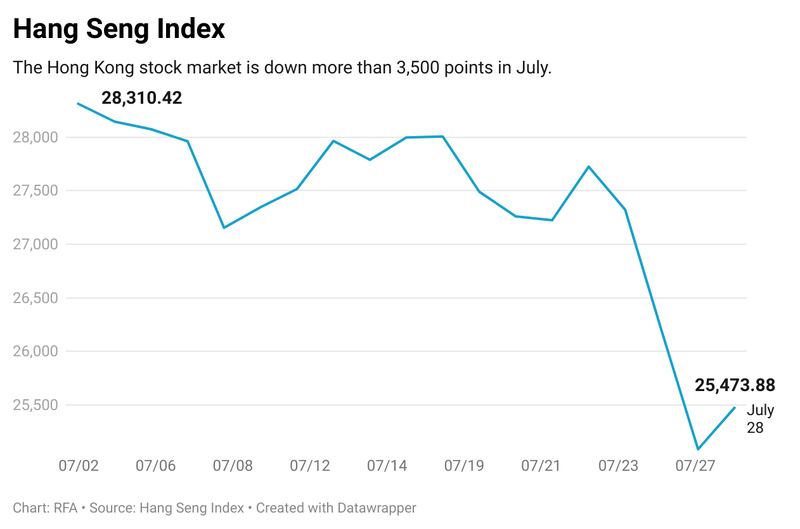Shares in major Chinese companies have sustained major losses in Hong Kong recent days following regulatory changes by the ruling Chinese Communist Party (CCP) affecting online food delivery and e-commerce platforms, as well as the private education sector.
Hong Kong's Hang Seng Tech Index plummeted by around 10 percent at one point during trading on Tuesday, while the Hang Seng Index lost around eight percent of its value before rebounding by around 1.5 percent on Wednesday.
The Shanghai Composite Index and Shenzhen Component Index fell by around three percent each on Tuesday amid fragile investor confidence following a month-long crackdown by Beijing on the tech sector.
Traders fear the latest crackdown on the nation's education, food delivery and property sectors could expand to other industries such as health care, as China looks to tighten its grip on the sector, Caixin Financial reported.
It quoted one trader as saying that investors feared a large-scale outflow of foreign capital from Chinese-listed stocks and bonds.
Tencent, which owns the social media platform WeChat, lost around nine percent of its share value on Tuesday, after its music arm gave up exclusive streaming rights, and as WeChat said it had stopped accepting new users pending a security upgrade.
Shares in Meituan fell by as much as 18 percent on the same day, after new rules requiring food delivery platforms to pay its delivery workers the full minimum wage, instead of treating them as self-employed contractors.
But Hong Kong economist Law Ka-chung said shares have been falling on the Hong Kong stock market since the start of the month.
"The market has been falling since July 1 ... this isn't just about policy risk [to investors] but also about overall market risk," Law said. "It's the entire market."
Permanent exodus feared
Recent changes to the rules governing the private tutoring, or "buxiban," sector in China have prompted huge falls in share values for tutoring chains New Oriental and Si Le Education, which sustain losses on Monday of around 40 percent.
But Law said the issue in Hong Kong is likely deeper-seated than a few heavily weighted stocks moving the market, with a more permanent exodus of investors likely under way.
Since the CCP imposed its draconian national security law on Hong Kong from July 1, 2020, hundreds of billions of yuan have poured into Hong Kong from mainland China, filling a hole left by the gradual withdrawal of foreign capital, according to official figures.
But there has been a sharp reduction in inward investment in the past two months, making Hong Kong look less attractive.
A recent survey of Japanese companies in Hong Kong found that more than half of them are worried about the impact of the national security law on the city's status as a financial center, while more than 25 percent said they were considering reducing their exposure, or divesting entirely from Hong Kong.
Asked why the national security law worried them, nearly 80 percent of the 600 respondents polled by the Japanese consulate, the Japan External Trade Organization (JETRO) and the Japanese Chamber of Commerce and Industry in Hong Kong listed "restrictions on the flow of information" as a concern.
Around 60 percent cited fears over the decline in the rule of law and judicial independence, while around 58 percent said the brain drain sparked by a wave of emigration was a worry.
Others cited possible social instability and vaguely defined definitions and "red lines" under the national security law.

Whither the independent judiciary
Li Kexian, associate professor at Tokyo International University, said foreign investors, including Japanese companies, want to know if there will be an independent judicial system left in Hong Kong following a city-wide crackdown on dissent under the new law.
"Japanese companies in Hong Kong are worried about whether judges can still make fair and independent rulings," Li said. "We estimate that some companies will be moving their operations out of Hong Kong in the short-to-medium term, by which we mean the next five years."
Li cited the examples of the New York Times, which relocated some of its Hong Kong operations to Seoul, and NAVER, which owns regional social media platform LINE, which has relocated operations to Singapore.
The poll of Japanese companies comes after a survey conducted by the American Chamber of Commerce (AmCham) found that more than 40 percent of 325 companies polled were either definitely planning to leave Hong Kong, or were thinking about it.
Three percent said they were getting out immediately, while 10 percent said they would do so by the summer's end, and 15 percent were planning to be gone by the end of the year.
A further 48 percent said they would likely leave in the next 3-5 years.
Of those planning to leave Hong Kong, 62 percent included discomfort with the national security law among the reasons, while 36 percent said they feared it would affect the quality of their children's education.
The Hong Kong government recently launched an ongoing campaign to "educate" secondary-school students about the law, which has left most of the city's political opposition behind bars and criminalized public criticism of the authorities and democratic political activity as "subversion," "secession," or "collusion with foreign powers."
Schools have been made responsible for ensuring that their students are "educated" about the new law, with morning assemblies and class registration sessions to include reference to the phrase "upholding national security is the constitutional responsibility of the Hong Kong Special Administrative Region."
A citywide crackdown on anyone linked to the 2019 protest movement intensified when the law took effect, and has included cases brought under colonial-era sedition laws as well as "illegal assembly" charges.
Almost all of the city's prominent pro-democracy figures, opposition lawmakers and social activists are now either behind bars or in exile.
Translated and edited by Luisetta Mudie.
